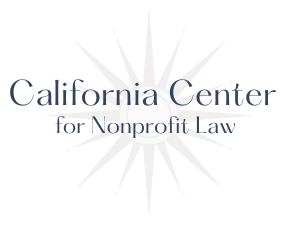
When Can a Nonprofit’s Website or Online Activity Become Prohibited Political Activity?
Non-profit organizations must take care to avoid any online activity that constitutes prohibited political activity, as it could endanger their tax-exempt status.
Most organizations, including nonprofit organizations, now maintain an online presence, such as utilizing a website and various social media platforms. These online efforts can increase visibility, aid in fundraising efforts, and allow organizations to communicate important information about their mission to a wider audience. However, organizations must take care to avoid any online activity that constitutes prohibited political activity, as it could endanger their tax-exempt status.
The California Center for Nonprofit Law is here to advise you on all legal requirements that impact your public charity, including those that may affect your tax-exempt status. Keep your charity compliant and tax-exempt by calling our office when you have questions about these important issues.
Website Postings
Just as a 501(c)(3) organization may not publish a written flyer or letter endorsing a particular candidate for public office, it may not post an endorsement of a candidate for office on its website. According to IRS Publication 1828, Tax Guide for Churches and Religious Organizations,17 (Aug. 2015)
A website is a form of communication. If an organization posts something on its website that favors or opposes a candidate for public office, the organization will be treated the same as if it distributed printed material, oral statements or broadcasts that favored or opposed a candidate.
Any postings on the website, or on a blog maintained by the organization, that staff members write necessarily will be attributed to the organization. As a result, these postings cannot violate the prohibitions on campaign intervention. On the other hand, posts by guest bloggers should not be attributed to the organization, so long as they are posted with an appropriate disclaimer to that effect. However, the IRS has ruled in the past that a blog is not analogous to a public forum, which leaves open the possibility that a guest blog post could be attributed to the host 501(c)(3) organization, particularly if the blogger includes statements endorsing one candidate for public office over another. See IRS Rev. Rul.2007-41.
Comments from members of the public on a blog posting also should not be attributed to the charitable organization, if the organization permits all comments to be posted, regardless of political viewpoint. Again, including a general disclaimer that comments by the public do not reflect the perspective or opinions of the organization is advisable.
Website Links
Charitable organizations also may be held to have engaged in prohibited political activity if they link to other organizations’ websites in some cases, depending on the facts and circumstances. When an organization establishes a link to another website, it is responsible for the consequences of establishing and maintaining that link, even though it cannot control the content of the linked site. Therefore, organizations should monitor the contents of sites to which they link, which may change over time, and adjust their links accordingly, to reduce the risk of prohibited political campaign intervention.
The website for a charitable organization may link to the websites of all candidates for a public office, as long as the website presents the links on a consistent, neutral basis for each candidate. Likewise, a charitable organization’s website can contain links to a broad range of Section 527 organizations, including PACs, which provide candidate profiles and voting histories, but cannot provide links to only a select group of Section527 organizations and PACs.
IRS rules about links between the websites of 501(c)(3) organizations and affiliated 501(c)(4) organizations are complex, particularly where the organizations maintain a joint website. The 501(c)(3) organization must especially take care to ensure that none of its assets are being used to support a website that engages in prohibited political activity.
Social Media Activity
A Section 501(c)(3) organization should not “friend” or “like” a candidate on Facebook (or its equivalent on other social media platforms), since those actions express a public preference for that candidate. It is less clear whether an organization can follow a candidate on X (formerly known as Twitter), as an organization may do so for informational purposes only. In this situation, the organization likely should follow all candidates for a public office, rather than only one or some candidates. However, the IRS still could take the position that following all candidates on X is not neutral, as visitors to the organization’s X site would not see that the organization was following all candidates, as only a certain number of accounts that a user follows appear at a particular time, which the user does not control.
It also remains unclear whether a Section 501(c)(3) organization can “friend” or “like” an organization on Facebook. The organization may do so to engage in lobbying or educational activities, rather than supporting the official’s candidacy. Nonetheless, from the point of view of the IRS, the organization may engage in impermissible campaign activity if the public official’s Facebook page shows only that the organization is friends with or “likes” the official with no further explanation. This activity may be particularly suspect if it occurs close to an election.
However, if a candidate for public office or public official requests to friend a charitable organization on Facebook or follow it on X, the organization should accept the request if its policy is to accept all such requests. If a candidate or public official likes an organization’s Facebook page, that individual’s actions are not attributable to the organization, as the organization cannot control the individual.
If the candidate for public office or public official should post a political message on the organization’s social media site, the organization can respond in one of three ways. It can delete the message, post a follow-up disclaimer message stating that messages posted by the public do not reflect the views of the organization, or post a general disclaimer on its Facebook wall or general information page. Regardless of its response, the organization should take a uniform approach to all such messages or posts, no matter their content.
Contact Us Today for Legal Assistance
The California Center for Nonprofit Law focuses its practice on legal matters that affect charities and other nonprofit organizations in California. This unique focus allows us to concentrate on keeping abreast of the ever-changing laws and policies as they develop over time. We are here to represent the interests of your nonprofit organization throughout every stage of your legal matter. Call us at (949) 892-1221, email us atinfo@npolawyers.com, or fill out our contact form online and schedule a consultation about your nonprofit organization today.
